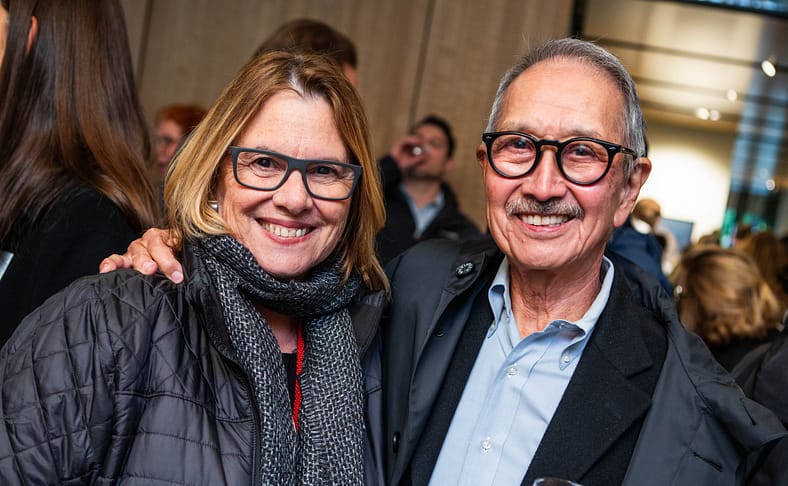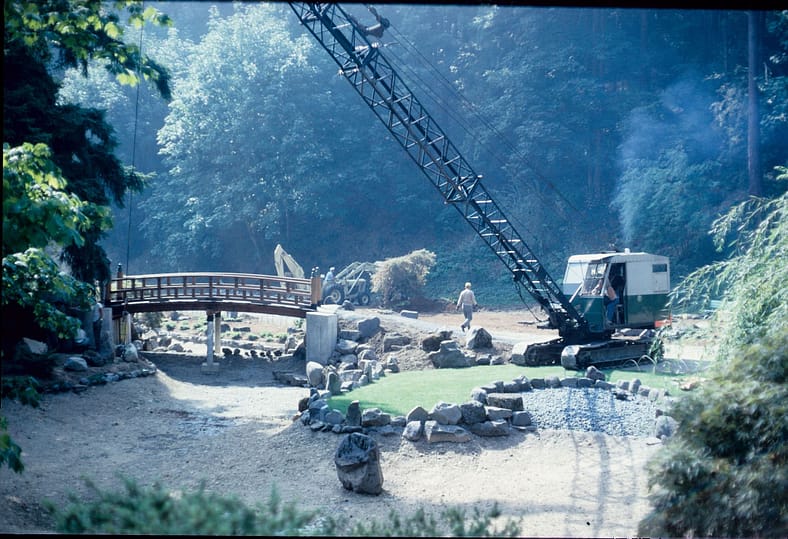
Portland Japanese Garden welcomed Ann Burroughs to give a keynote address at its Annual Membership Meeting in May of 2024. Burroughs, an internationally recognized leader in the advancement of human rights, currently serves as President and CEO of the Japanese American National Museum (JANM) in Los Angeles, California. She is also Chair of the Japanese American Confinement Sites Consortium and has worked with Amnesty International for many years, including serving as Chair of the organization’s Global Assembly.
Burroughs sat down to chat about JANM and Portland Japanese Garden after a walk through its grounds. The stroll through a landscape in its May glory made an impression. “Being able to be here in spring and having an aperture in the weather was wonderful because I could experience the Garden without the rain, with the contrast of the trees, the elevations, the blue sky, the dappled effect—it’s exquisite,” Burroughs said. “Certainly, one of the most beautiful Japanese gardens outside of Japan that I’ve ever seen. It takes one’s breath away.”
Portland Japanese Garden and JANM both serve as important ambassadors for cultural diplomacy, a means of establishing peace and friendship through the mutual exchange of the arts, values, beliefs, customs, and more. Both were borne out of a need for change in the face of hostility toward those of Japanese ancestry. Yet, while they seek to foster understanding, they take different paths to achieve it. JANM was incorporated in 1985 and today serves as “the national repository of Japanese American history, [creating] groundbreaking historical and arts exhibitions, educational public programs, award-winning documentaries, and innovative curriculum that illuminate the stories and the rich cultural heritage of people of Japanese ancestry in the United States.”
Related: Three Years Old and Interned in an American Concentration Camp
“[JANM exists] to ensure that what happened to Japanese Americans never happens to any other group,” Burroughs explained. “Hope for the future and the constant vigilance of history exist together in our work. [JANM has] very intentionally decided to use the platform and the megaphone of the Japanese-American experience to talk about the present, to show how this history remains relevant and urgent today and how we can use the lessons of history to shine a light on the present and shape a more just future.”

Portland Japanese Garden, meanwhile, was founded as a space for people, irrespective of origin or lot in life, to connect with each other on a fundamental level as human beings through nature, particularly through the harmonious qualities of Japanese aesthetics. Through its landscape design, art exhibitions, festival celebrations, and other cultural programming, the Garden takes an intentionally subtler approach than JANM. Curator Emeritus Sadafumi Uchiyama once noted in an interview with the American Society of Landscape Architects that, “We see our Japanese garden as a depository of all kinds of emotions. Everyone is a human being. Language, cultural background, and ethnicity doesn’t matter. We are accepting. We welcome the human being. We provide the essential experience of being a human being in harmony with nature. We try to bring human beings closer to that harmony.”
This approach was felt by Burroughs. “[The Garden is] infused with a sense of peace,” she shared. “A portal through which one can touch one’s own humanity on the deepest level. I was walking around with [Garden CEO Steve Bloom], walking slowly and chatting, and there were a few moments where we sat and looked and experienced, and I was completely engulfed by that feeling. At JANM, the mission is more immediate because we have to show that history is relevant and, in the current context, urgent. We have to make sure that the past never becomes the prologue for the present or the future. Whereas here, it just is.”
A History That Resonates

Portland Japanese Garden was founded in 1963, a time still stained by a virulent anti-Japanese sentiment that had begun as early as the 19th century and was exacerbated by World War II. The organization’s first Garden Director, Kinya Hira (1964-69), was stabbed in a premeditated hate crime on its grounds; its original designer, Professor Takuma Tono of Tokyo Agricultural University also faced violent racism while on the job.
Related: The Experience of Oregon’s Nikkei
The organization’s effort to persevere through animosity means something to Burroughs, someone who put her own wellbeing on the line to achieve a better future. “There’s a strong resonance with my own experience having spent my formative years and my youth in South Africa as part of the anti-apartheid struggle,” Burroughs shared. Though Burroughs is careful to note she grew up with “incredible white privilege” in a deeply segregated society, Amnesty International declared her a “Prisoner of Conscience” after she was arrested for campaigning against apartheid in her native country.
Her background combined with her current role at JANM made this trip to Portland a particularly meaningful one. “I remember coming once before quite some time ago and it leaving a major impression on me. But I think having worked in the space and being much more aware of cultural diplomacy now than I was then before I worked at JANM, I have a much deeper appreciation, I think, of what it symbolizes and what it means.”
Creating Linkages Around the World

Portland Japanese Garden was founded as a space for people, irrespective of origin or lot in life, to connect with each other on a fundamental level as human beings through nature, particularly through the harmonious qualities of Japanese aesthetics. Japan Institute, the organization’s global cultural initiative, was founded after Portland Japanese Garden leaders looked at how the organization could expand upon its success in peacemaking with programming both locally and abroad.
Through Japan Institute’s International Exchange Forum, it has convened Peace Symposia that welcome people from fields that share a common pursuit of peace but often don’t intersect such as those in nature, culture, art, and government. In 2023, two of the symposia took place in South Africa. Burroughs, a South Africa native, was among the many global thought leaders featured in the programming.
“It was a profound experience in almost every way,” Burroughs noted. “I think for every one of us who was there, whether as speakers or participants—it touched us deeply, not only on an institutional level, , but also on the level of deep human contact.”

“I grew up literally a stone’s throw away from [Kirstenbosch National Botanical Garden, the venue of Japan Institute’s Symposium in Cape Town]. I was a part of the anti-apartheid struggle; I was a political prisoner. It was amazing for me to go back and meet comrades and colleagues and to see what they have done over all of these years. On an institutional level, representing JANM, it was an extraordinary exercise in peace and democracy building. It was meaningful to be there, to talk to other organizations about uplifting the arts, looking to build a more just future, and how we can do that across continents and cultures. [Japan Institute has] given the world a gift by creating these linkages and community across the globe.”
The Powerful Symbolism of the Garden

The concept of peace, the end of all hostility between peoples and all else that lives, is simple. The way peace is achieved—that’s the complicated part. Portland Japanese Garden only exists because people from a variety of backgrounds—cultural, social, business, government, and more—worked together using their various expertise and perspectives to fashion something more meaningful than what one person could have done alone. So while the Garden takes an approach that is less direct, it celebrates and is grateful for JANM. The feeling is mutual. “The Garden is a powerful entity in terms of cultural diplomacy and strengthening the relationship between Japan and the U.S. It embeds and nurtures critical cultural linkages in an entirely unique way,” Burroughs said.
“Here one absorbs peace and harmony by an osmotic process,” Burroughs noted when asked for her thoughts on Portland Japanese Garden and Japan Institute’s shared mission of Inspiring Harmony and Peace. “I’m looking behind you, looking through the trees and looking at the sun on those spring leaves, and it’s just gorgeous. That sense of peace and harmony is everywhere.”
Written by Will Lerner, Communications Manager for Portland Japanese Garden and Japan Institute.